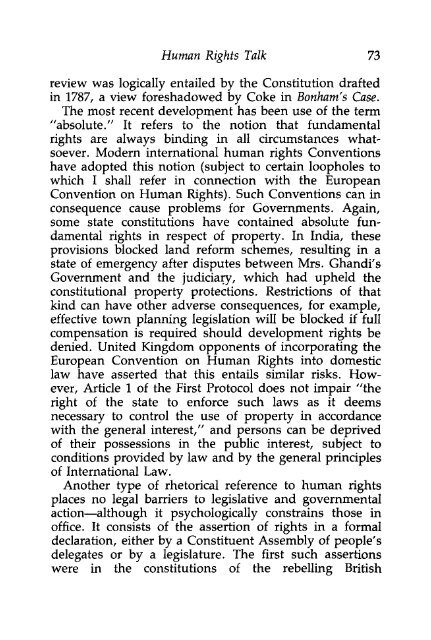The United Kingdom and Human Rights - College of Social ...
The United Kingdom and Human Rights - College of Social ...
The United Kingdom and Human Rights - College of Social ...
You also want an ePaper? Increase the reach of your titles
YUMPU automatically turns print PDFs into web optimized ePapers that Google loves.
<strong>Human</strong> <strong>Rights</strong> Talk 73<br />
review was logically entailed by the Constitution drafted<br />
in 1787, a view foreshadowed by Coke in Bonham's Case.<br />
<strong>The</strong> most recent development has been use <strong>of</strong> the term<br />
"absolute." It refers to the notion that fundamental<br />
rights are always binding in all circumstances whatsoever.<br />
Modern international human rights Conventions<br />
have adopted this notion (subject to certain loopholes to<br />
which I shall refer in connection with the European<br />
Convention on <strong>Human</strong> <strong>Rights</strong>). Such Conventions can in<br />
consequence cause problems for Governments. Again,<br />
some state constitutions have contained absolute fundamental<br />
rights in respect <strong>of</strong> property. In India, these<br />
provisions blocked l<strong>and</strong> reform schemes, resulting in a<br />
state <strong>of</strong> emergency after disputes between Mrs. Gh<strong>and</strong>i's<br />
Government <strong>and</strong> the judiciary, which had upheld the<br />
constitutional property protections. Restrictions <strong>of</strong> that<br />
kind can have other adverse consequences, for example,<br />
effective town planning legislation will be blocked if full<br />
compensation is required should development rights be<br />
denied. <strong>United</strong> <strong>Kingdom</strong> opponents <strong>of</strong> incorporating the<br />
European Convention on <strong>Human</strong> <strong>Rights</strong> into domestic<br />
law have asserted that this entails similar risks. However,<br />
Article 1 <strong>of</strong> the First Protocol does not impair "the<br />
right <strong>of</strong> the state to enforce such laws as it deems<br />
necessary to control the use <strong>of</strong> property in accordance<br />
with the general interest," <strong>and</strong> persons can be deprived<br />
<strong>of</strong> their possessions in the public interest, subject to<br />
conditions provided by law <strong>and</strong> by the general principles<br />
<strong>of</strong> International Law.<br />
Another type <strong>of</strong> rhetorical reference to human rights<br />
places no legal barriers to legislative <strong>and</strong> governmental<br />
action—although it psychologically constrains those in<br />
<strong>of</strong>fice. It consists <strong>of</strong> the assertion <strong>of</strong> rights in a formal<br />
declaration, either by a Constituent Assembly <strong>of</strong> people's<br />
delegates or by a legislature. <strong>The</strong> first such assertions<br />
were in the constitutions <strong>of</strong> the rebelling British

















